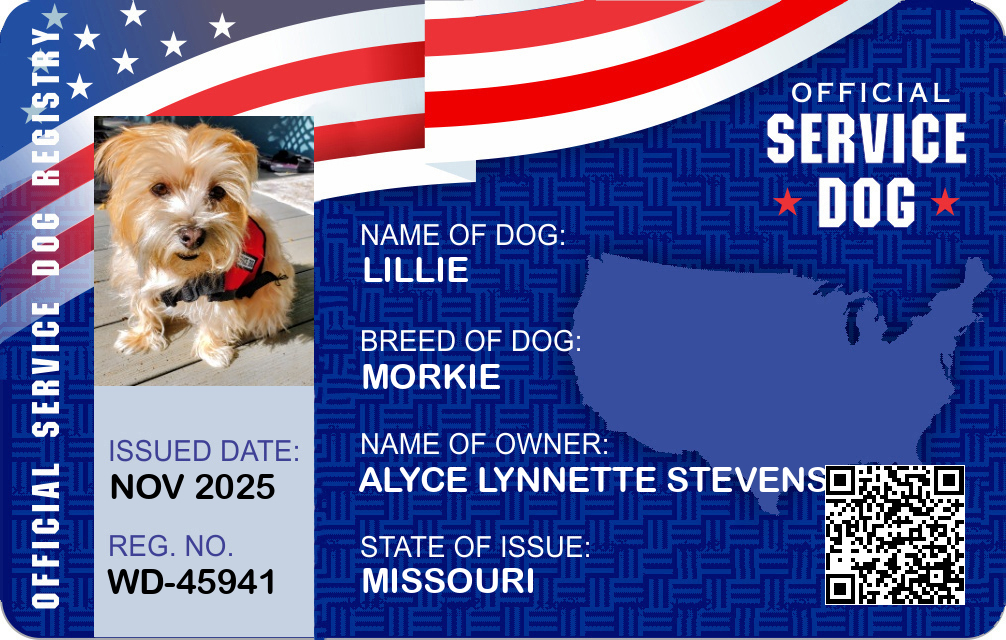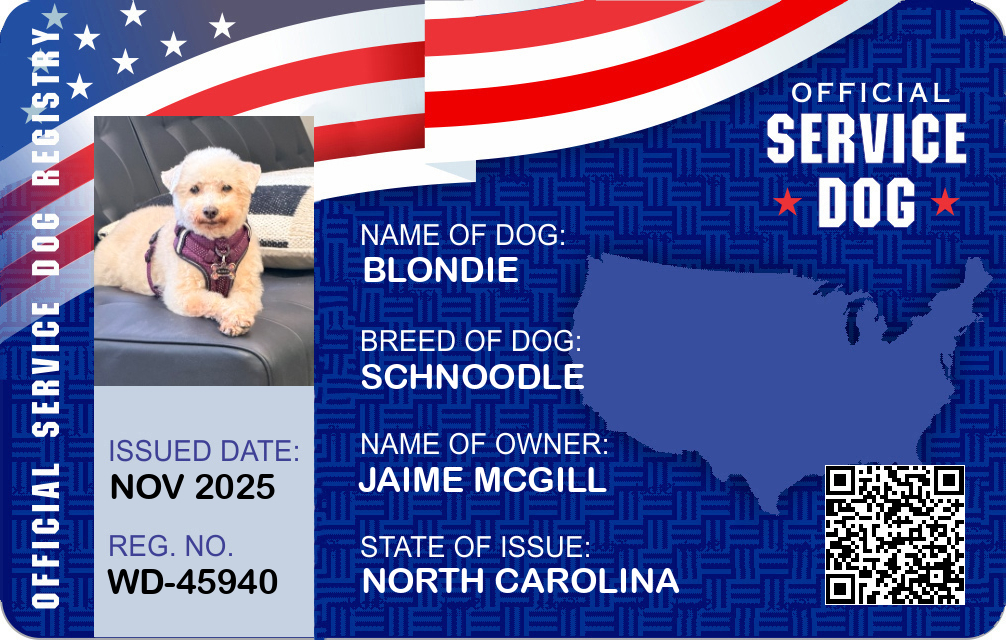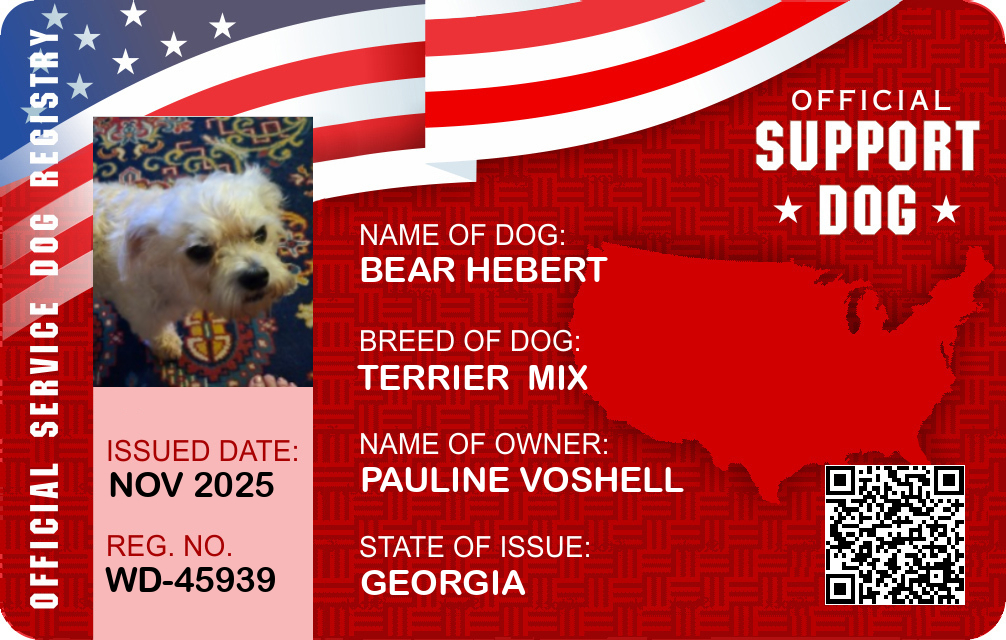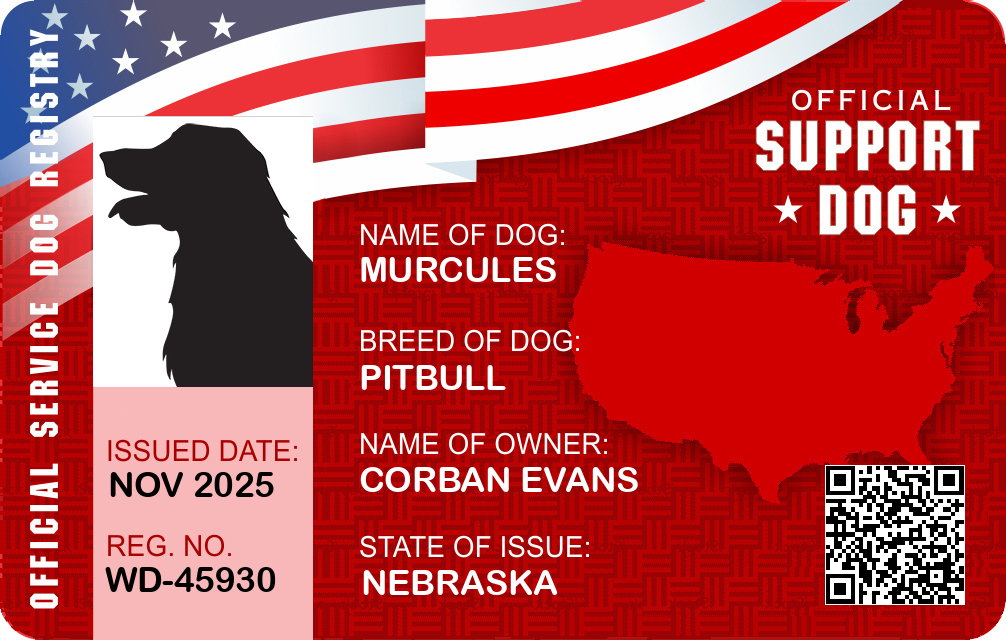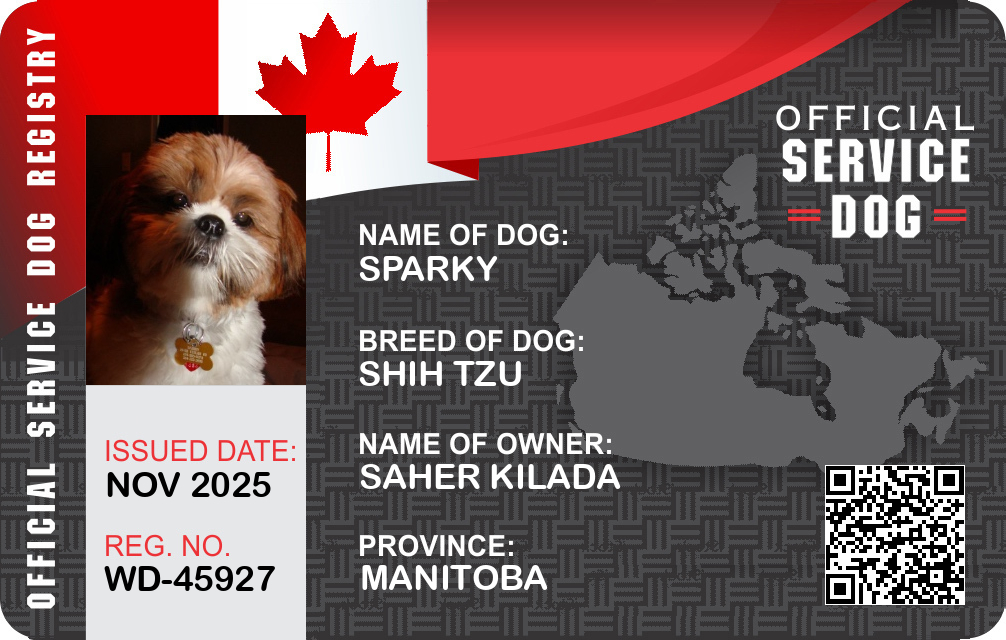Kansas Service Dog Laws
Register Your Dog
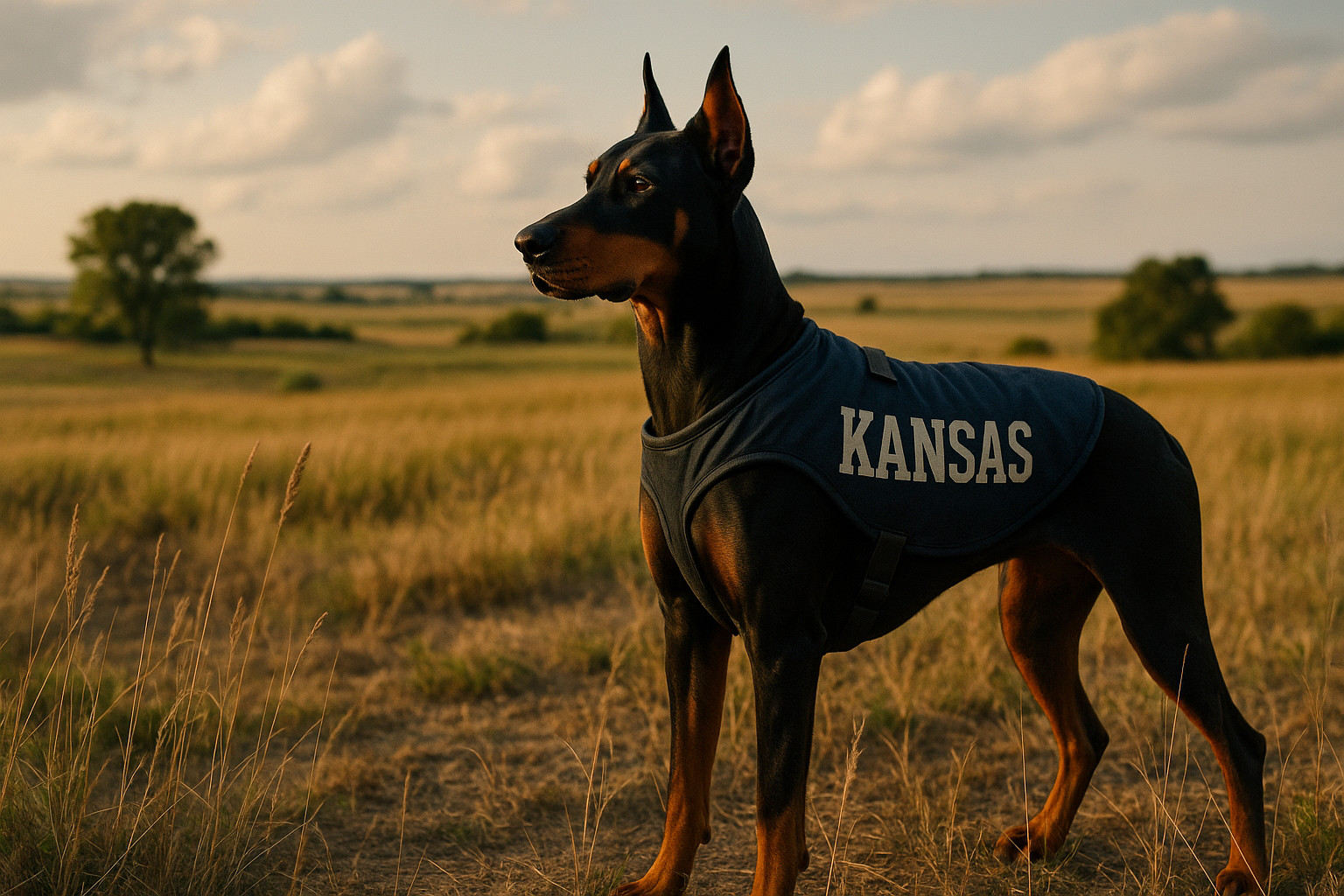
Overview of Service Dog and Legal Definitions in Kansas
What is a Service Dog?
In Kansas, as in the rest of the United States, a service dog is defined as a dog that is individually trained to perform tasks or do work for a person with a disability. These tasks must be directly related to the individual’s disability. For example, service dogs might assist with guiding those who are visually impaired, alerting individuals who are deaf, pulling a wheelchair, retrieving items for someone with mobility challenges, or providing assistance during seizures. The essential component is that the tasks performed by the dog mitigate some aspect of the handler’s disability, enabling greater independence and functioning in daily life.
How Service Dogs Differ from Other Types of Assistance Animals
Service dogs differ substantially from other types of assistance animals, such as emotional support animals (ESAs) and therapy dogs. Unlike service dogs, ESAs do not require specialized training to perform specific tasks but rather provide comfort and emotional support to individuals with psychological conditions. While therapy dogs often serve an important role in providing comfort to people in hospital settings, schools, or disaster areas, they also do not perform specific disability-related tasks. The legal protections and access rights for service dogs are notably more comprehensive due to their specialized training and essential role in assisting individuals with disabilities.
Key Federal Laws Affecting Service Dogs (e.g., ADA, FHA, ACAA)
The rights of service dog handlers in Kansas are primarily governed by several key federal laws. The Americans with Disabilities Act (ADA) is the most crucial legislation, mandating that service dogs be granted access to public accommodations, private businesses, government facilities, and public transportation. Under the Fair Housing Act (FHA), individuals with disabilities have the right to request reasonable accommodations for service dogs in housing, even in properties with no-pet policies. Additionally, the Air Carrier Access Act (ACAA) ensures that service dogs are allowed on flights to assist their handlers for a safe and accessible travel experience.
State-Specific Service Dog Laws in Kansas
Housing Rights and Responsibilities
In Kansas, individuals who utilize service dogs have the right to reasonable accommodation in housing through both federal protections (via the FHA) and state laws. Landlords in Kansas, regardless of their pet policies, are required to accommodate individuals with service dogs by waiving pet bans and ensuring reasonable support is provided to the handler. While landlords may request verification of the disability and necessity for the service dog, they cannot impose extra fees or deposits. Notably, the need for the service dog, rather than the breed or size, must guide the landlord’s decision in providing such accommodations.
Public Access and Accommodation
Service dogs and their handlers in Kansas enjoy broad public access rights under both the ADA and state laws. These access rights apply to places such as restaurants, hotels, retail stores, hospitals, and theaters. Business operators must permit service dogs to accompany their handlers in all areas open to the public, without imposing additional charges. Furthermore, handlers cannot be segregated or isolated from others due to their service dog. Establishing a legitimate reason related to health or safety is necessary before denying access to a service dog team, such as if the dog is out of control or not housebroken.
Transportation and Travel Rules
In accordance with federal regulations like the ADA and ACAA, as well as state-specific guidelines, service dog handlers in Kansas can access public transportation systems, airports, and airlines with their service dogs. The ADA requires transit operators, including buses and trains, to accommodate service dogs without imposing fees. Air travel requires advance notification to the airline, allowing the service dog to accompany the handler in the cabin without any additional charge. Kansas follows these standards, ensuring smooth travel for individuals relying on service dogs.
Employment and Workplace Considerations
Under the ADA, employers in Kansas are mandated to provide reasonable accommodations for employees with disabilities, including those using service dogs. This mandate implies the modification of workplace policies or environments to facilitate equal opportunity and access. While employers can request documentation substantiating the disability and necessity for the service dog, they must engage in an interactive process with the employee to determine reasonable accommodation measures, unless it results in undue hardship for the business.
Documentation, Requirements, and Processes in Kansas
Service Dog Documentation and Who Can Issue It
There is no official registry or certification required for service dogs under federal or Kansas state law. However, handlers might be asked to verify their disab
ility and the necessity for a service dog, especially in housing and employment contexts. This verification may include an attestation or letter from a licensed healthcare provider or mental health professional, substantiating the disability and the critical role the service dog plays in mitigating functional limitations.Landlord, Business, and Provider Verification Rules
In situations like housing, landlords in Kansas can request documentation to verify the disability and need for a service dog when it is not readily apparent. For businesses and public accommodations, questioning is limited by the ADA, allowing only two inquiries — whether the service animal is required due to a disability and what task the animal has been trained to perform. Detailed documentation or proof of certification cannot be mandated by businesses or service providers in Kansas under state or federal law, upholding a simplified and non-intrusive approach.
Rights, Limitations, and Legal Risks
Rights Service Dog Handlers Have in Kansas
Handlers of service dogs in Kansas are entitled to broad rights that ensure they can live, work, and travel independently and with dignity. These rights include accessing public facilities, securing housing accommodations, and equal employment opportunities without discrimination or unfair hardship. The legal framework is established to create an enabling environment for individuals with service dogs, fostering inclusivity across various domains of public and private life.
Limits on Service Dog Protections and Common Restrictions
Despite the comprehensive rights provided, certain limits exist on service dog protections. Establishments can legally exclude service dogs if their presence compromises legitimate safety requirements, such as entry into specific healthcare settings where the animal might pose contamination risks. Furthermore, if a service dog is disruptive, aggressive, or not properly controlled, establishments can request its removal. However, even in these events, access to the handler must remain unaffected.
Penalties for Fraud or Misrepresentation
Due to increasing instances of fraudulent representations of pets as service animals, Kansas, like many other states, enforces penalties against such actions. Misrepresenting a pet as a service dog could result in fines or other legal repercussions, emphasizing the importance of adherence to law and ethical standards. These measures protect the integrity of service dog operations and the rights of individuals who genuinely require them.
Practical Guidance for Service Dog Handlers in Kansas
How to Qualify for a Service Dog Legitimately
To qualify for a service dog in Kansas, individuals must have a disability as recognized under the ADA and require a trained service dog to perform specific tasks that mitigate aspects of this disability. Those interested should seek assistance from reputable organizations specializing in service dog training and placement. It’s also advisable to consult with healthcare professionals to obtain documentation supporting the necessity of a service dog to facilitate the application processes with landlords and employers.
How to Talk to Landlords, Airlines, and Employers
When discussing service dog arrangements, communication is key. Be prepared to provide basic information on your service dog’s role related to your disability while respecting privacy laws. Landlords and employers might require documentation supplied by a qualified healthcare provider. When planning air travel, notify airlines ahead of time, providing any documentation requested in compliance with the ACAA. Maintaining open and respectful communication often eases the process, ensuring your rights are upheld.
Summary of Service Dog Laws in Kansas
**- Kansas recognizes service dogs as those trained for specific disability-related tasks, distinct from emotional support animals or therapy dogs.
- Service dog handlers are protected by federal laws like the ADA, FHA, and ACAA, alongside state regulations.
- Handlers have rights to public access, equal housing, and supportive employment environments, with requirements for reasonable accommodation.
- Limitations exist in contexts where safety or health considerations are paramount, and service dogs may be excluded if they are disruptive or out of control.
- Documentation is typically not mandatory for public access but can be required for housing and employment accommodation—obtained from healthcare professionals.
- The state enforces penalties for fraudulent service dog representation, ensuring the legal protections are not abused and genuine needs are met.
- Effective communication with landlords, airlines, and employers safeguards rights and ensures the service dog’s role is respected and accommodated.**
By understanding and adhering to these guidelines, service dog handlers in Kansas can navigate their rights and responsibilities confidently, fostering a compliant and cooperative environment for all parties involved.



